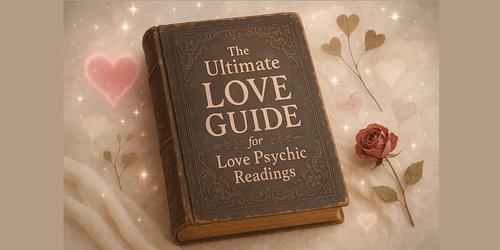
To pay for your reading on your telephone bill, simply call
Instantly message our featured psychics online via psychic messenger.
Click to start
Register now to start your reading online. PSYCHIC MESSENGER- Cheapest psychic service in the UK
- Our readers are available 24/7
- 100% confidential service
- In-depth, concise, personal readings
- Thousands of 5* reviews
Published 06/05/2023 • Updated 11/12/2023 by Joanne Jones
4 Attachment Styles
Attachment is a fundamental component of human development that influences how we form relationships throughout our lives.
It refers to the emotional bond between a child and their primary caregiver, which forms through a series of interactions over time. Although there are many types of attachment, researchers have identified four attachment signs that can be used to classify attachment styles.
Attachment theory, developed by psychologist John Bowlby, suggests that early interactions between infants and their caregivers shape the patterns of attachment that individuals form throughout their lives.
Trusted Psychics relationship experts want to give you a deeper look into your love life and help you understand the relationship behaviour patterns you may be experiencing.
Relationship attachments refer to the patterns of emotional and behavioural responses individuals develop in romantic relationships based on their experiences with caregivers in their younger life.
Research has shown that these attachment patterns can significantly impact romantic relationships, affecting how individuals communicate, respond to conflicts, and maintain emotional intimacy in their partnerships.
Therapy and other interventions, such as spiritual or love readings with a live psychic reader, can detect and address negative attachment patterns and foster healthier attachments to improve the overall quality of romantic relationships.
There are 4 attachment styles: secure, anxious-preoccupied, dismissive-avoidant, and fearful-avoidant.
4 Attachment Styles
The 4 Attachment styles are psychological frameworks that describe how individuals form emotional bonds with others. According to research, there are four types of attachment.
Attachment styles refer to the different ways individuals perceive and relate to others in close relationships, and these styles are based on the quality of early attachment experiences with caregivers. Psychologist Mary Ainsworth identified four attachment styles in the 1970s: secure, anxious-ambivalent, avoidant, and disorganised.
Understanding attachment types can be useful in personal and professional relationships. By recognising their attachment style and that of others, individuals can better communicate and meet each other's emotional needs. Therapy and self-reflection can also help individuals develop more secure attachments.
What Are the 4 Attachment Styles?
Attachment theory is a psychological concept that describes how humans interact with their caregivers during their early years of development. The attachment types are founded on the belief that the bonding between a child and their primary caregiver during infancy structures the child's social and emotional behaviour later in life.
The types of attachment refer to the degree of intimacy, security, and trust an individual enjoys in their relationships. There are 4 attachment styles that individuals may exhibit, secure attachment, Anxious attachment style, dismissive, and fearful attachment.
Secure Attachment
The Secure attachment type is considered the healthiest and most desirable attachment style, characterised by a strong sense of trust and intimacy between two individuals.
People with secure attachments tend to feel comfortable expressing their emotions, seeking support, and forming close relationships with others. This type of attachment is often developed in childhood through loving and positive parent-child relationships, where children have a safe, secure base and learn to feel confident, safe, and loved.
Securely attached individuals tend to have higher self-esteem, are more emotionally resilient, tend to be more empathetic to others and have a higher chance of successful future relationships.
While secure attachment styles are the most common, around 50-60% of individuals exhibit this trait and maintain healthy relationships; people with insecure attachment styles can learn to become more secure through therapy or other supportive interventions.
Building close, stable relationships with others can also help foster secure attachment.
Avoidant Attachment
Avoidant attachment is one of the 4 attachment styles, characterised by a tendency to avoid emotional closeness and distance oneself from others when feeling vulnerable or overwhelmed.
According to research, avoidant attachment types originate from early childhood experiences where the child learns that seeking support and comfort is futile or even punished. As a result, individuals may develop a rigid self-reliant attitude and have difficulty seeking help or expressing emotions in close relationships or intimate relationships.
People with avoidant attachment styles tend to prioritise independence and autonomy over intimacy and may seem distant or emotionally detached. They have difficulty trusting others and forming lasting bonds or meaningful relationships, fearing that relying on others would lead to disappointment or rejection.
In romantic relationships, avoidant attachment styles can manifest as discomfort with intimacy or emotional expression, a preference for casual or distant relationships, and a tendency to withdraw or become defensive in conflict situations.
While avoidant behaviour may serve as a protective mechanism to cope with early childhood trauma, it can also hinder one's ability to form supportive and fulfilling adult relationships.
Anxious Attachment
Avoidant-insecure attachment is one of the 4 attachment styles identified in studies on human relationships and development. These styles of attachment are characterised by a deep-seated need for reassurance and a fear of rejection or abandonment.
Individuals with this emotional attachment tend to feel insecure in their relationships and have difficulty trusting others, making them unable to achieve long-term relationships.
They may have a deep-seated fear of fear abandonment and worry about their partner leaving them or not being there for them when they need them the most.
Research has found that an anxious attachment style typically develops in childhood due to inconsistent parenting or neglect.
Avoidant infants who do not receive enough attention and care from their caregivers may develop an anxious type of attachment style to cope with the uncertainty and instability in their environment. This attachment can lead to difficulties in forming and maintaining relationships in adulthood. Individuals with anxious attachment styles tend to be overly dependent and clingy with their romantic partners and need to be reassured they have a secure bond with their partners.
One of the key features of anxious attachment is the tendency to seek constant reassurance and validation from others, which can manifest in various ways, such as seeking frequent contact with one's partner or expressing concerns about the relationship.
Individuals with an anxious-avoidant attachment may also become anxious or upset when their partner does not promptly respond to their messages or calls.
Disorganised Attachment
Disorganised attachment is regarded as the most complex and puzzling form of attachment because a range of contradictory behaviours in the child marks it.
Human infants with disorganised attachment can display moments of engaging with their caregiver or avoiding them altogether.
Disorganised-insecure attachment typically forms in the presence of trauma or abuse, where the child's primary caregiver is the source of comfort and fear.
Children with disorganised attachment styles may show a tendency to display disorientation, clinginess, fearfulness, and even aggression in the presence of their primary caregiver. They may also develop a sense of ambivalence, where they alternate between seeking warmth and comfort from the caregiver to running away from them in intense fear.
Another aspect of disorganised attachment in infancy is dissociation. Dissociation can occur when the child cannot form a coherent emotional response to their experiences of the world around them. As a result, they may appear detached, aloof, and disconnected and struggle with social interactions and emotions; in adult relationships, they may fear intimacy.
Love Readings
Which one of the 4 attachment styles do you have? If you would like to learn more and gain spiritual insight into relationships, a love reading with a Trusted Psychic might help provide clarity and understanding.
By examining your behaviour and relationship patterns, a psychic can offer insights into why specific patterns of attachment may be repeating themselves and how to break free from them.
A love reading can be a valuable tool in examining past relationships and identifying patterns or individual differences in behaviours that may have contributed to your attachment process. It can also help you better understand your own emotions and needs and those of your partner.
A Trusted Psychic can use their intuition and psychic abilities to tap into the energy and emotions surrounding your relationships, providing guidance and support in navigating love and romance. They can help you clarify the challenges and obstacles in your relationships and guide you on moving forward in a way that aligns with your highest good.
Talking to a live psychic reader or an instant Live Messenger psychic can be a powerful tool for gaining insight, healing, and growth in your relationships.
Whether looking for guidance in a current relationship or seeking to attract a new partner, a psychic reading can help you connect with your inner wisdom and find your path to a healthier relationship.
FAQs
What Are the 4 Attachment Styles?
The 4 attachment styles have been identified, each characterised by different behaviour and emotional regulation patterns.
Secure attachment style: This is considered the healthiest and most desirable attachment style. Children with secure attachment feel secure when their caregiver is present, and they can explore the environment without fear and exhibit positive social behaviours.
Anxious-preoccupied attachment style: This attachment style is characterised by anxious adults who crave intimacy, are overly dependent on their romantic partners, and experience intense anxiety when separated from them.
Avoidant-dismissive attachment style: Anxious adults with this attachment tend to avoid intimacy and emotional connection. They may appear emotionally detached, lack empathy, and dismiss the importance of their closest relationships.
Fearful-avoidant attachment style: This is characterised by individuals who both crave intimacy and connection and fear it. They may exhibit inconsistent behaviours in their relationships, such as reaching out for emotional support while also pushing their partner away.
Can Your Attachment Style Change?
Attachment styles, which psychologist John Bowlby first identified, are formed in childhood, and can greatly impact an individual's relationships throughout their lifetime. While it was once believed that attachment styles were permanent and unchangeable, recent research has shown that they can indeed be modified through various methods.
This means that individuals who may have developed less healthy attachment styles in childhood or early adulthood can make positive changes to their relationships by learning to form healthier attachment styles.
One of the most effective ways to modify attachment styles is through therapy. While the process can be challenging, many individuals have found that therapy provides them with the necessary tools for positive change.
By working with a trained therapist or an experienced psychic, individuals can better understand the emotional experiences that influenced their attachment style and develop strategies for creating more secure and healthy relationships. This can include developing greater emotional awareness and learning to set appropriate boundaries in relationships.
In addition to therapy, better relationships can also play a role in improving attachment styles. Individuals who surround themselves with positive and supportive people can find that their attachment styles naturally shift towards a more secure and healthy one.
These supportive relationships can provide a sense of safety and security, allowing individuals to let go of less healthy attachment patterns and develop a more positive outlook on relationships.
Self-reflection is another powerful tool for modifying attachment styles. By learning to identify and reflect on their emotional experiences and relational patterns, individuals can discover strategies for improving their attachment styles.
This may involve learning to communicate more effectively in relationships or practising mindfulness to develop a deeper sense of emotional awareness.
While attachment in children develops from an early age in childhood, based on emotional experiences, they are not permanent and can change based on life experiences. Therapy, better relationships, or self-reflection can help an individual move from a less healthy attachment style to a more secure one and adjust the attachment style within a relationship to create a healthier dynamic.
How to Contact a Trusted Psychic
Phone a live Psychic 24 hours a day View all our live phone psychic and tarot readers online.
Message a live Psychic 24 hours a day: View all our live messenger psychic and tarot readers online.
Text a live Psychic 24 hours a day: View all our live text psychic and tarot readers online.
How To Contact A Trusted Psychic
Phone a live Psychic 24 hours a day
View all our live phone psychic and tarot readers online.
View All Live readersMessage a live Psychic 24 hours a day:
View all our live messenger psychic and tarot readers online.
launch messengerRecent Articles From the Trusted Psychics Blog

Psychic Love Readings: What They Reveal About Your Relationship
Discover with Trusted Psychics what psychic love readings are and what they reveal about your relationships, from new to existing relationships & ex-partners.

What Is a Psychic Love Reading? The Ultimate Love Guide
Explore our ultimate love guide on psychic love readings & how they can help you with finding your twin flame, soulmate, new love, & whether an ex will return.

The Ultimate Guide to Finding Your Soulmate Through Tarot
Here's the ultimate guide to finding your soulmate through Tarot. Find out what The Lovers, 2 of Cups & 4 of Wands Tarot cards mean for finding your soulmate.

7 Soulmate Myths Unveiled Video
In this video, Trusted Psychics breaks down 7 of the biggest soulmate myths that could be blocking real love & your soulmate connection from entering your life.

Why Choose a Psychic Love Reading?
Why choose a psychic love reading? They offer more than just yes/no responses; a gifted love psychic can interpret your partner’s feelings and his intentions.

The Power of Love Readings Video
Feeling lost in love? This video breaks down what a love psychic reading really is, how it works, and why so many people turn to psychics for love issues.

